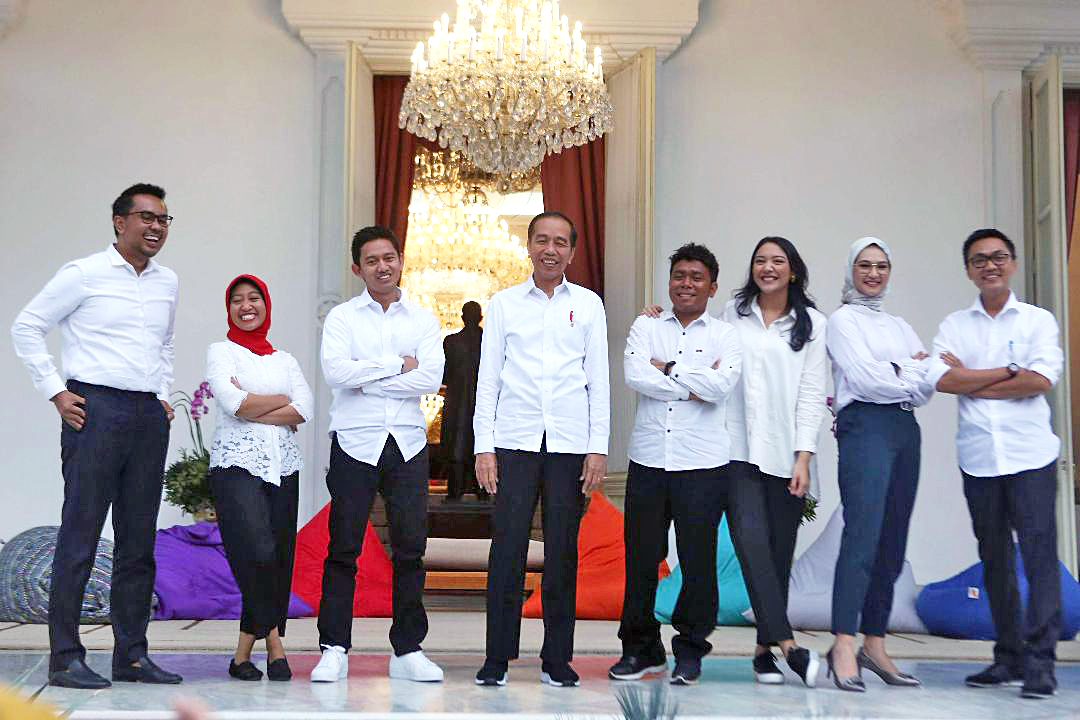Millennials.
All over the world, the term millennial – which Statistics Indonesia (BPS) defines as those born between 1980 and 2000 – elicits sighs and eye-rolls, conjuring up images of avocado toast, coworking spaces and hoverboards.
The much-vaunted Indonesian millennial, sought after by politicians for their votes and businesspeople for their cash, is a mainstay in the media – recent online news headlines about millennials range from the Indonesian Ulema Council (MUI) launching a new app to appeal to millennials to the development of new houses for millennials, priced at Rp 200 million (US$14,567) to 500 million.
In January, the Education and Culture Ministry announced that the word, or the Indonesian equivalent milenial, was the most popular word in the country throughout 2019.
In general, the typical media conception of the Indonesian millennial is not that different from its global counterpart – that of an upper-middle class, highly-educated, latte-sipping, GoFood-ordering urban youth, probably employed in the technology or creative sector.
The other millennials
Indonesian population aged 20-39 by educational attainment
0
But the data shows that most of the country’s millennials only have a high-school level education, work in blue-collar or low-level service jobs, with an average monthly income of only around US$150.
According to the Wittgenstein Centre for Demography and Global Human Capital, only 14.4 percent of millennials in Indonesia have any post-secondary education at all, while only a tiny 0.38 percent have graduate degrees. And according to BPS data from 2017, the average wage for a millennial is only around Rp 2.1 million.
Even in the cosmopolitan region of Greater Jakarta, which has the largest per capita income in the country, around 25 percent of men aged 20 to 34 and 38 percent of women only have junior high school diplomas or lower, according to a joint Australian National University and University of Indonesia study in 2010.
Young and struggling
Living with nine relatives in a small one bedroom house measuring about 25 square meters in Kampung Muka, North Jakarta, 22-year-old Tri Adhitia Diantomo, known to friends and family as Adit, is thus much more representative of the majority of millennials than the common media depiction might have you believe.
Adit stopped going to school after graduating from the local state junior high, because he was "naughty," by his own admission, and now earns a salary of Rp 1.5 million ($106) a month working six days a week as a driver for a forwarding agent, picking up packages from Senen train station in Central Jakarta and driving them as far away as Depok and Bekasi in the neighboring province of West Java.
Adit said he planned to pursue a Kejar Paket C, or senior high-school equivalency diploma, next year, which would allow him to seek a job at a bigger company, for bigger pay.
One of his high-school graduate friends, he said, worked as a driver for a television station, and made around Rp 4 million a month.
His current job is far from the white-collar, high-tech work that people might imagine millennials engage in.
The work is physical and arduous, involving the loading and unloading of unwieldy boxes in the Jakarta heat, and driving long distances in an old, air-conditionless pick-up truck.
The deliveries he makes include smaller packages like fruit and documents, to large shipments ranging from motorcycles to live animals. Adit said the weirdest package he had to deliver was a live pig.
The pig was eventually delivered to the private home of a wealthy man who kept many other animals in his house. "It was like a zoo," he recalled.
Despite the labor-intensive nature of his job, Adit said he enjoyed it, because it allowed him to be outdoors and go different places.
According to BPS data from 2017, around 20 percent of millennials are blue-collar workers, while around 25 percent work in sales or service jobs, compared to only 1.4 percent who hold managerial positions and 7 percent who work in professional jobs.

Tri Adhitia Diantomo
Wearing a red Sheila on 7 T-shirt, and a bunch of colorful Sheila on 7 rubber bracelets, Adit, whose hobbies include listening to music and watching YouTube videos, and who has no plans to get his own place anytime soon, does have some things in common with the stereotypical millennial.
He is also pretty tech-savvy, though the only gadget he owns is a Chinese-made smartphone that he bought on layaway. "If it's not destroyed, I won't replace it," he said, laughing.
Almost all of his salary currently goes to installments for the motorcycle he recently bought, and he depends on his per diem of Rp 50,000 (plus the occasional tip) for miscellaneous expenses such as data packages for his phone and going to Sheila on 7 concerts.
But mostly he spends his free time at the local community unit (RW) office with the neighborhood youth group. On Wednesday nights, he practices percussion with his friends – not on drum sets but on used buckets and paint cans. They play at weddings and community gatherings and have even performed in front of Jakarta Governor Anies Baswedan.
When asked what he would do if he could do anything, Adit said he would open an angkringan-style coffee shop that didn’t have any wi-fi, “so people will have to talk to each other instead of looking at their phones.”
The struggling young mom
Riska, another 22-year-old who lives not too far from Kampung Muka on Jl. Tongkol Dalam, North Jakarta, represents a big chunk of the millennial population – the stay-at-home mother.
According to the 2010 study, around 56 percent of women aged 20 to 34 in the Greater Jakarta region were mothers, more than two-thirds of whom were unemployed.
Riska got married at the age of 19, not long after she graduated from a private vocational school. "I wasn't planning to get married, but there was someone who was serious and proposed and refusing the proposal would mean refusing jodoh [a mate], so I accepted," she said.
She worked briefly as an administrative assistant at a small office after she got married, but left the job after she gave birth to her son, Arshakha, who is now 2 years old.
Riska's 27-year-old husband, Zainal, works as a driver and makes around Rp 3 million a month.
Recently, she started taking orders to string beads into bracelets with her mother, and gets Rp 1,000 a dozen for their labor. She said they could finish around 80 dozen bracelets in three to four days. The bracelets are sold as souvenirs in Central Java, where they are priced at Rp 5,000 apiece.

Riska
Every day, Riska takes her son from the boardinghouse she rents with her husband to her parents' cramped home.
Her father, 55-year-old Endang, used to work as a truck driver, but has stopped working in the last few months due to a number of ailments, including heart problems and diabetes.
Riska helps out by taking her father to doctor's appointments and by minding the small warung (stall) her parents keep in front of their house. In turn, her mother, Asnah, 47, helps her take care of her son.
A homebody even before she got married, Riska does not go out much, and her online activity is limited to Facebook and WhatsApp. She also helps her friend sell some small household knickknacks like soap dispensers on Facebook for some extra cash, making Rp 5,000 to Rp 10,000 per item.
When asked what she does for recreation, Riska laughed. "It's very rare, usually only when my husband is off work on Sundays. At most, we'll go to Atlantis [waterpark] with my son," she said, referring to a water park at nearby Ancol.
Riska said her dream was to open her own small business, perhaps selling sembako or basic commodities, so that she could make money while still taking care of her son.
‘Demographic bonus’ is just a number
Without university degrees or technical qualifications, Adit and Riska are typical of the majority of the 82 million-strong millennial generation, which makes up the bulk of Indonesia's much-touted "demographic bonus."
The "bonus", defined as a period when a country's productive population (aged 15 to 64) outnumbers its non-productive population (below 15 and over 64), is currently underway and is expected to peak in 2030, with millennials the largest generation among the productive population.
Ariane Utomo, a social demographer at the University of Melbourne who took part in the 2010 study, said that she preferred the term demographic "window of opportunity" to "bonus," and that the expectations surrounding the so-called "bonus" may be based on assumptions that are no longer applicable.
Unlike in South Korea, which welcomed its demographic dividend, Indonesia sees the arrival of the largest educated cohort of young adults as coinciding with a complex set of labor market and economic conditions, Ariane said.
South Korea, on the other hand, had a high number of young adults from the mid 1970s to the mid 1980s when there were plenty of manufacturing jobs around, she explained.
Current-day Indonesia, meanwhile, is going through what economists call "premature deindustrialization", with the share of manufacturing jobs stagnating without ever reaching the heights that earlier industrializing nations such as South Korea enjoyed.
At the same time, Ariane said, millennials were entering the labor force at a time when there was "a rapid global transformation in the nature of work," characterized by the rise of the gig economy and an increase in vulnerable employment.
All eyes on the privileged
In November, President Joko "Jokowi" Widodo unveiled his crack new team of young expert staffers, who seem to embody the millennial image, with entrepreneurs aplenty, not to mention a couple of Ivy League graduates in the mix.
At a sprightly 35 years old, Gojek founder and newly-appointed Education and Culture Minister Nadiem Makarim, is probably the country's premier millennial, and has said he would be the “millennial representative” in the President's Cabinet.
But, with a bachelor’s degree from Brown, an MBA from Harvard and an estimated net worth of US$100 million, Nadiem is far from the typical Indonesian millennial, and the President seems to have realized that, saying in his second inaugural address that the development of human capital – particularly that of the younger generation – would be one of the main priorities of his second term.

President Joko "Jokowi" Widodo (fourth left) strikes a pose with his presidential staff at the Merdeka Palace on Nov. 21, 2019. (JP/Seto Wardhana)
Consequently, the Jokowi administration has focused its efforts on helping millennials improve their skills and supporting their transition between school and the working world, with the aim of preparing young people for so-called Industry 4.0 jobs – with programs such as the pre-employment card and the President's planned "talent management" body.
Ariane said there was nothing wrong with the government's efforts at "skilling" but that even if millennials gained the skills, it was unclear whether there would be enough jobs.
Entrepreneurship has been touted as another solution to the changing economic landscape, with the President preparing an omnibus law to empower small-and-medium businesses like the ones Adit and Riska dream of one day starting.
But Ariane pointed out that, until very recently, most of Indonesia's workforce had been self-employed, particularly in the informal sector.
“The evidence is not very clear whether policy campaigns to promote entrepreneurship can be effective in generating millions of meaningful, stable and upward-mobility enabling jobs," she said.
While the problem is a global one, the challenge in Indonesia is exacerbated by the sheer number of young people entering the labor market, many with skill sets that do not match industry.
In the end, she said the current situation was unprecedented and that “nobody really knows how to tackle the changing nature of work."
"One thing the government should do is to broaden the social safety net to help young people cope with their precarious position," she said.
----












